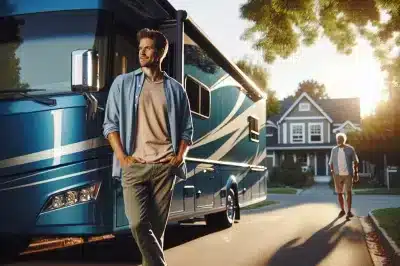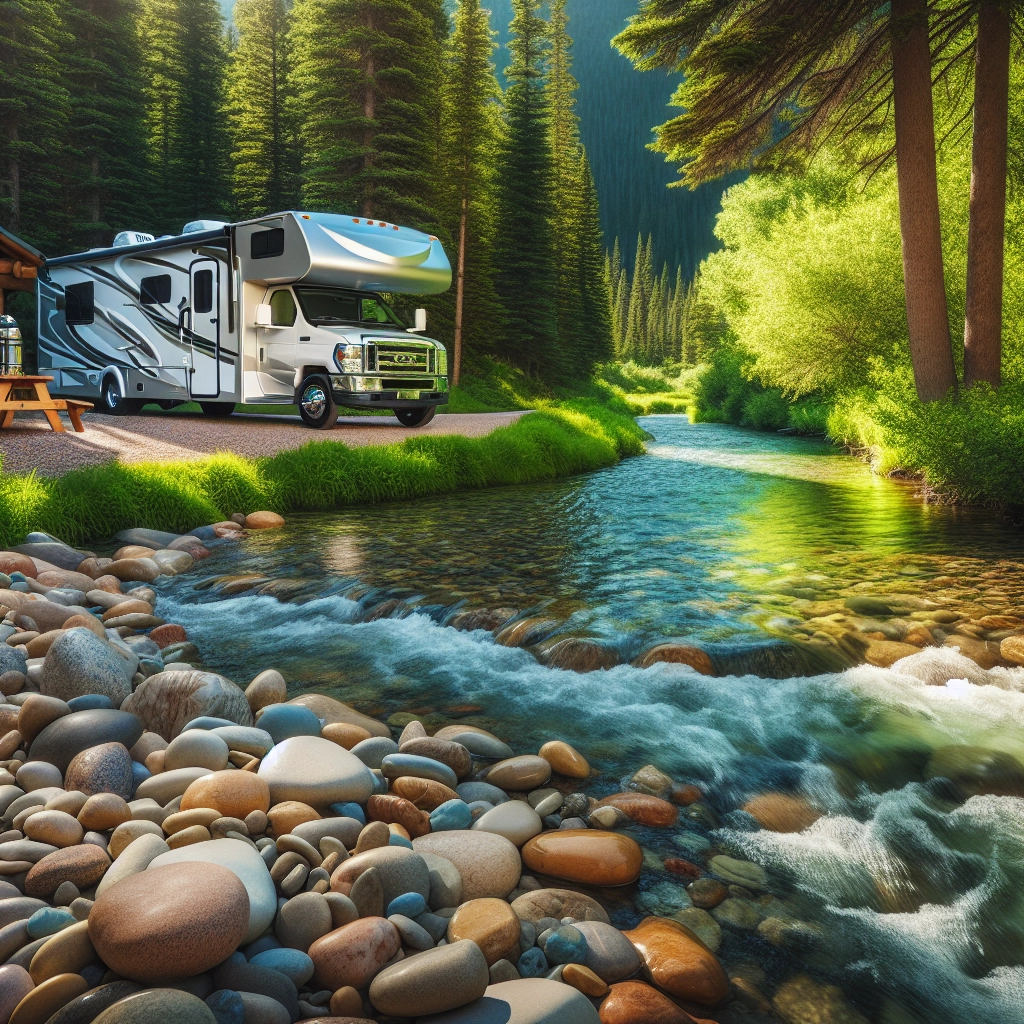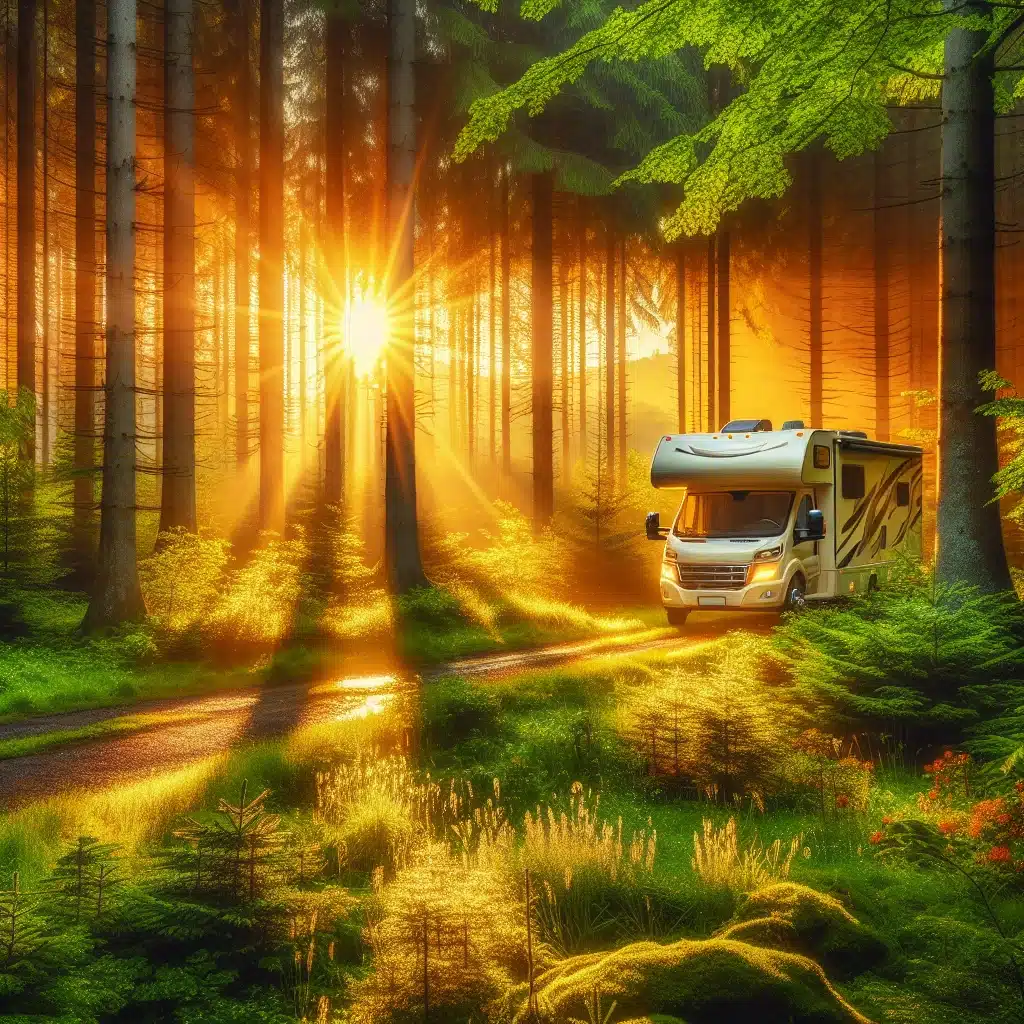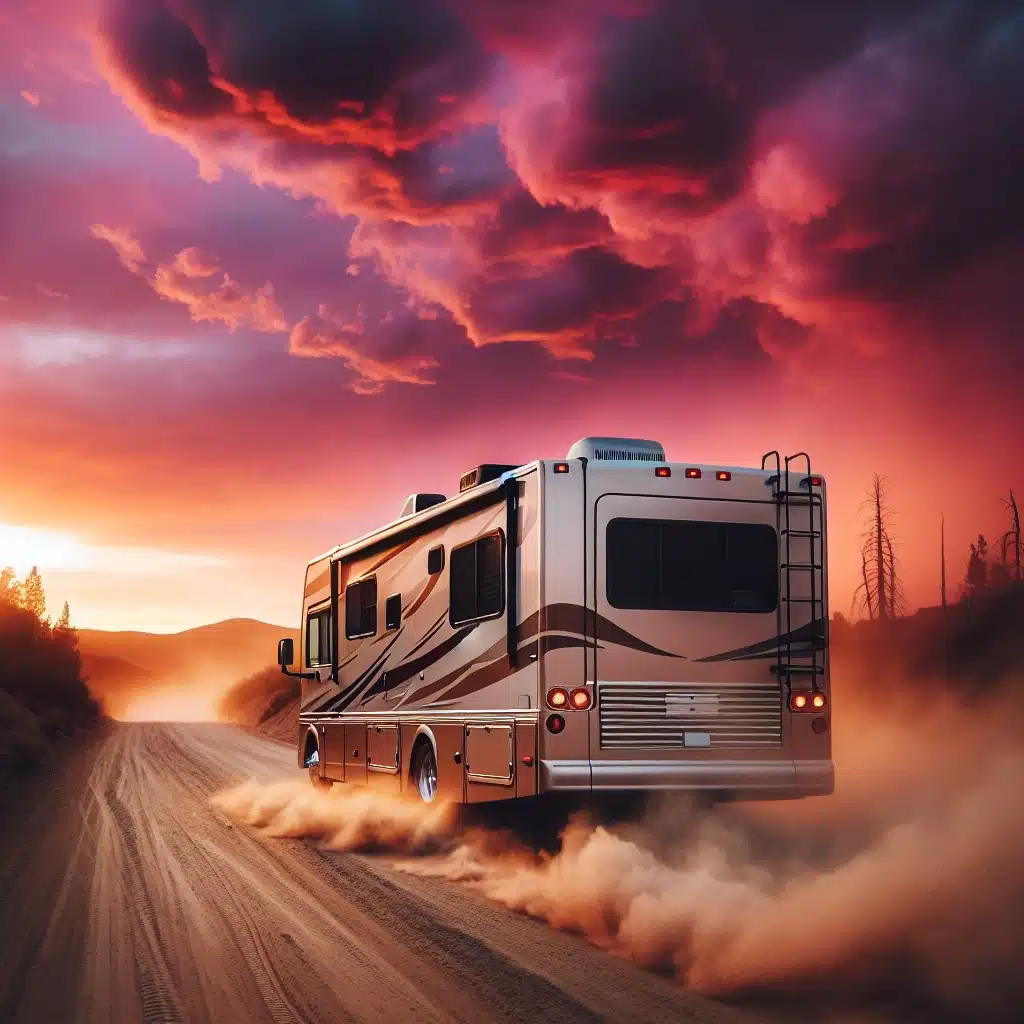Table of Contents

Embracing Solar: The Road to Sustainable RV Life
Imagine the freedom of the open road with the sun as your fuel. Solar power is revolutionizing the way we think about RV travel, offering an eco-friendly, cost-effective way to enjoy the boondocking lifestyle. It’s not just about reducing your carbon footprint; it’s about gaining independence and embracing a sustainable way of living that keeps you connected to the great outdoors.
Key Takeaways
- Discover the synergy between solar power and boondocking for ultimate freedom.
- Learn the essentials of solar power systems for RVs to make informed decisions.
- Understand how to calculate your energy needs for a tailored solar setup.
- Find out how to pick solar panels that fit your RV’s requirements and your travel style.
- Gain insights into the initial steps of transitioning to solar for an eco-friendly journey.
Why Solar and Boondocking Are a Match Made in Heaven
Boondocking, or dry camping, is all about self-sufficiency. It’s you, your RV, and nature – no hookups, no problem. Solar power is the perfect partner for this adventure. With the right setup, you can capture the sun’s energy to power your essentials, from lights to refrigerators, without the noise or fumes of a generator. This harmonious blend of solar and boondocking not only reduces your environmental impact but also enhances the serenity of your wilderness escapes.
The Basics of Solar Power for Your RV
Solar power for your RV isn’t just a trend; it’s a practical solution for energy on the go. The core components include solar panels, a charge controller, batteries, and an inverter. Solar panels collect energy from the sun and convert it into electricity. The charge controller ensures your batteries get charged correctly, while the inverter turns that stored energy into usable power for your RV’s appliances. With these basics, you’re on your way to a greener, cleaner RV experience.
Getting Started with Solar for Boondocking
Taking the first step towards a solar-powered RV lifestyle is exciting, but where do you begin? The key is to understand your energy needs and to choose components that meet those needs reliably. This means looking at your travel habits, the devices you can’t live without, and how much power they require. It’s not a one-size-fits-all solution, but a personalized approach that ensures your solar system supports your unique way of life on the road.
Assessing Your Solar Needs: How Much Power Do You Need?
Before you invest in solar panels, it’s crucial to figure out how much power you’ll need. Start by making a list of all the devices you use in your RV and their power consumption. Next, consider how often you use them. This will give you a daily energy usage estimate. Remember, it’s better to overestimate your needs a bit to avoid running out of power when you least expect it. With this information, you can size your solar system to ensure it can handle your energy demands.
Choosing the Right Solar Panels for Your RV
Selecting solar panels isn’t just about the price tag; it’s about quality, efficiency, and fit. There are various types of solar panels available, including monocrystalline, polycrystalline, and thin-film. Monocrystalline panels are highly efficient and space-saving, making them ideal for RVs with limited roof space. Polycrystalline panels are more budget-friendly but require more space. Thin-film panels are flexible and lightweight, but they typically have lower efficiency. Consider your space, budget, and energy needs to find the perfect match for your RV solar system.
Battery Banks: Storing Your Sun-Powered Supply
Once you’ve harnessed the sun’s energy, you need a place to store it. That’s where battery banks come in. Think of them as your personal power reservoirs, holding onto that solar power until you need it. You’ll want batteries that are durable, reliable, and suited to your energy needs. Deep-cycle batteries are the go-to for RV solar systems because they’re designed for the long haul, providing steady power over extended periods and handling repeated discharge and recharge cycles.

Installation Insights: Setting Up Your Solar System
Installing a solar system on your RV is a project that can bring immense satisfaction. It’s a step towards energy independence and sustainability. But, it’s also a task that requires careful planning and attention to detail. Whether you’re a seasoned DIYer or a newbie to the world of solar, understanding the installation process is key to a successful setup.
Step-by-Step Guide to DIY Solar Installation
- Start by mapping out where you’ll place the solar panels on your RV’s roof. Make sure they’re in a spot that gets maximum sun exposure.
- Install the mounting brackets, ensuring they’re securely attached to the roof. This is crucial for both the safety and longevity of your solar panels.
- Fix the solar panels onto the mounting brackets and connect them to the charge controller, which should be placed close to the batteries to minimize power loss.
- Wire the charge controller to the battery bank, taking care to observe the correct polarity to prevent any damage.
- Connect the inverter to the battery bank, which will convert the stored DC power into AC power for your RV’s appliances.
- Test the system to ensure everything is working correctly before hitting the road.
Remember, safety first. Always follow the manufacturer’s instructions and handle electrical components with care.
Professional Installation: When to Call in the Experts
If you’re not confident in your ability to install a solar system safely, or if you simply prefer the assurance that comes with professional workmanship, it’s time to call in the experts. A professional installer can ensure your system is optimized for efficiency and safety. They can also help you navigate any warranties or technical issues that may arise. When it comes to tapping into the power of the sun, there’s no shame in getting a helping hand to ensure everything is set up perfectly.
Maintaining Your Solar Setup: Tips and Tricks
Like any other part of your RV, your solar setup requires regular maintenance to perform at its best. Fortunately, solar systems are relatively low-maintenance. A few simple habits can keep your system running smoothly, ensuring you have power when you need it and extending the life of your components.
Cleaning and Caring for Solar Panels
Keeping your solar panels clean is essential for maximum efficiency. Dust, leaves, and bird droppings can block sunlight and reduce your panels’ power output. Regular cleaning with a soft cloth or brush and soapy water will do the trick. Avoid using abrasive materials that can scratch the surface of the panels. Also, be mindful of the weather; cleaning your panels on an overcast day or in the early morning can prevent water spots from the sun drying the water too quickly.
Battery Maintenance for Optimal Lifespan
Your battery bank is the heart of your solar system. To keep it beating strong, regular check-ups are necessary. For lead-acid batteries, ensure the fluid levels are adequate and top them up with distilled water if needed. Keep the terminals clean and tight to prevent corrosion and ensure good conductivity. If you’re using lithium batteries, they require less maintenance, but you should still keep an eye on their state of charge and avoid depleting them completely. A well-maintained battery bank can last for years, saving you money and hassle in the long run.

Eco-Friendly Practices: Beyond Just Using Solar
Adopting solar power is a fantastic step towards eco-friendly RV living, but it doesn’t stop there. Sustainable living on the road encompasses a range of practices that reduce your environmental impact and help preserve the beautiful natural spaces we love to explore.
Conservation Techniques While Boondocking
- Use LED lighting to lower energy consumption and extend battery life.
- Install low-flow faucets and showerheads to conserve water.
- Practice mindful water usage by taking shorter showers and turning off the tap while brushing your teeth.
- Opt for rechargeable batteries for small electronics to reduce waste.
- Keep your RV well-insulated to maintain temperature and reduce the need for heating and cooling.
- Plan meals to minimize food waste and conserve cooking energy.
- Invest in a good quality, energy-efficient refrigerator to keep food fresh longer and reduce power usage.
These simple habits can significantly reduce your ecological footprint and enhance your overall experience with nature.
Responsible Disposal: Managing Waste Sustainably
Proper waste management is a critical aspect of sustainable boondocking. Always follow the ‘Leave No Trace’ principles by disposing of waste properly. This means separating recyclables, composting organic waste when possible, and ensuring all trash is disposed of in appropriate facilities. Use biodegradable products to minimize your impact on the environment and be mindful of the products you use, opting for those with less packaging and more eco-friendly materials.
Maximizing Solar Efficiency on the Road
Getting the most out of your solar setup is key to a successful boondocking experience. Efficiency is not just about having the right equipment; it’s also about how you use it.
Positioning Panels: How to Harness Maximum Sunlight
Positioning your solar panels correctly can make a world of difference in their efficiency. Always aim to park your RV so that your panels can get direct sunlight throughout the day. Consider the angle of the panels; they should be perpendicular to the sun’s rays for maximum exposure. If your panels are adjustable, tilt them according to the season – higher in the winter when the sun is lower and flatter in the summer when it’s higher in the sky.
Using Energy Wisely with Smart Appliances and Habits
Smart energy use goes hand in hand with an efficient solar system. Invest in energy-efficient appliances that consume less power without sacrificing performance. Use a programmable thermostat to control heating and cooling. Turn off appliances and lights when not in use, and make the most of natural light during the day. Charge your devices during peak sunlight hours so that you’re using the energy as it’s being generated, which is more efficient than pulling from your battery bank later.

Overcoming Challenges: What to Do When the Sun Doesn’t Shine
Even the best solar setups can face challenges when the weather doesn’t cooperate. Cloudy days can significantly reduce your solar panels’ output, but with a few strategies, you can still keep the lights on.
Alternative Charging Methods for Overcast Days
- Consider a supplemental wind turbine, which can generate power on windy, overcast days.
- Use a generator as a backup, but choose a fuel-efficient model to maintain your eco-friendly commitment.
- Drive your RV for a short period; the alternator will charge your house batteries while the engine runs.
- Plan your energy usage around the weather forecast, saving non-essential tasks for sunnier days.
By being prepared and flexible, you can handle the unpredictability of nature without sacrificing your comfort or eco-friendly principles.
Alternative Charging Methods for Overcast Days
Cloudy skies can dampen solar energy collection, but they don’t have to leave you powerless. Exploring alternative charging methods ensures you stay charged and ready, no matter the weather. A portable generator can serve as a reliable backup, and if you opt for a fuel-efficient model, you’ll maintain your eco-friendly stance. Additionally, your RV’s engine can help top off your batteries; just a short drive can replenish some of your power reserves. Lastly, consider a wind turbine, which can complement your solar panels on breezy days, making sure you harness all nature’s energy.
Emergency Prep: Backup Plans for Power Interruptions
When the unexpected hits, a solid backup plan is your best friend. Keep a portable power station on hand for emergencies; it’s like a power bank for your RV. Stock up on essentials that don’t require electricity, like manual can openers and battery-powered lights. And remember, knowledge is power—knowing how to troubleshoot your solar system can save the day when technical issues arise. Be prepared, and you’ll turn a potential crisis into just another part of the adventure.
Legal and Regulatory Considerations
As you embrace the solar-powered boondocking lifestyle, it’s important to stay informed about the legal and regulatory aspects. Navigating these can ensure you enjoy your freedom without any unwelcome surprises. From permits for oversized solar setups to regulations about where you can park and for how long, understanding the rules will keep your journey smooth and stress-free.
Understanding Boondocking Laws and Regulations
Boondocking comes with a set of rules that vary by location. Public lands often have specific guidelines on how long you can stay, while some areas may prohibit overnight parking altogether. It’s essential to research the rules of your destinationbeforehand. Use resources like local ranger stations, online forums, and dedicated apps to stay up-to-date. Respecting these laws not only ensures your compliance but also helps preserve the natural areas we all love.
Ensuring Compliance with Solar Installations and Usage
When it comes to solar installations, compliance is key. This means adhering to electrical codes and securing the necessary permits. Workmanship matters too; proper installation ensures safety and efficiency. If you’re not a solar DIY expert, consider hiring a certified professional who can guarantee that your setup meets all standards and regulations. Peace of mind comes from knowing your solar system is as safe as it is sustainable.
FAQ
How does solar power increase my independence while boondocking?
Solar power is the cornerstone of true off-grid living. It allows you to generate your own electricity without relying on campground hookups or noisy generators. With a well-designed solar system, you can explore more remote locations and stay longer without needing to refuel or recharge. Solar power gives you the freedom to live on your own terms, surrounded by nature, with all the comforts of home right there in your RV.
What are the initial costs and long-term savings of a solar RV setup?
Investing in a solar RV setup does have upfront costs, but it’s like planting a seed that grows into a tree of savings. The initial investment includes the cost of solar panels, batteries, charge controller, inverter, and installation materials. You might also consider the cost of a professional installer if you choose not to do it yourself. However, once you’re set up, the sun’s energy is free, which means you’ll be saving on campground fees, generator fuel, and maintenance costs. Over time, these savings can offset the initial costs, and with solar panels lasting 25-30 years, the long-term benefits are substantial.
Can I install solar panels on any type of RV?
Good news! Solar panels can be installed on just about any RV, from massive Class A motorhomes to cozy pop-up campers. The key is to choose the right system for your space and power needs. For smaller RVs, flexible solar panels that conform to the roof’s shape are a great option. Larger RVs can accommodate more and bigger panels. The only real requirement is a bit of roof real estate where the panels can soak up some sun. With various mounting options available, there’s a solar solution for nearly every type of RV out there.
How do I maintain my solar power system while on the road?
Maintenance on the road is all about keeping things simple and efficient. Regularly check your solar panels for debris or damage, especially after harsh weather. Keep the batteries topped up and clean, and ensure all connections are tight and corrosion-free. It’s also wise to monitor your energy consumption to avoid overtaxing your system. A little vigilance goes a long way in keeping your solar power system humming along smoothly as you explore the great outdoors.
In conclusion, embracing solar power for your RV is more than just an eco-friendly choice; it’s a lifestyle that offers freedom, savings, and a deeper connection with nature. The initial costs are an investment in a sustainable future, one that pays off with every sun-soaked mile. Whether you’re driving a tiny trailer or a luxurious motorhome, solar panels can be your ticket to energy independence. And with a little care, your mobile solar power plant will keep you charged up and ready for adventure. So go ahead, find that perfect boondocking spot, and let the sun power your journey to the next unforgettable destination.
- Boondocking RVs: Flexible Solar Solutions – 3 March 2024
- Renewable Energy Tips for Full-Time Boondocking RVers – 2 March 2024
- Boondocking Solar Power Systems: Sizing Options & Solutions for Motorhomes – 1 March 2024
